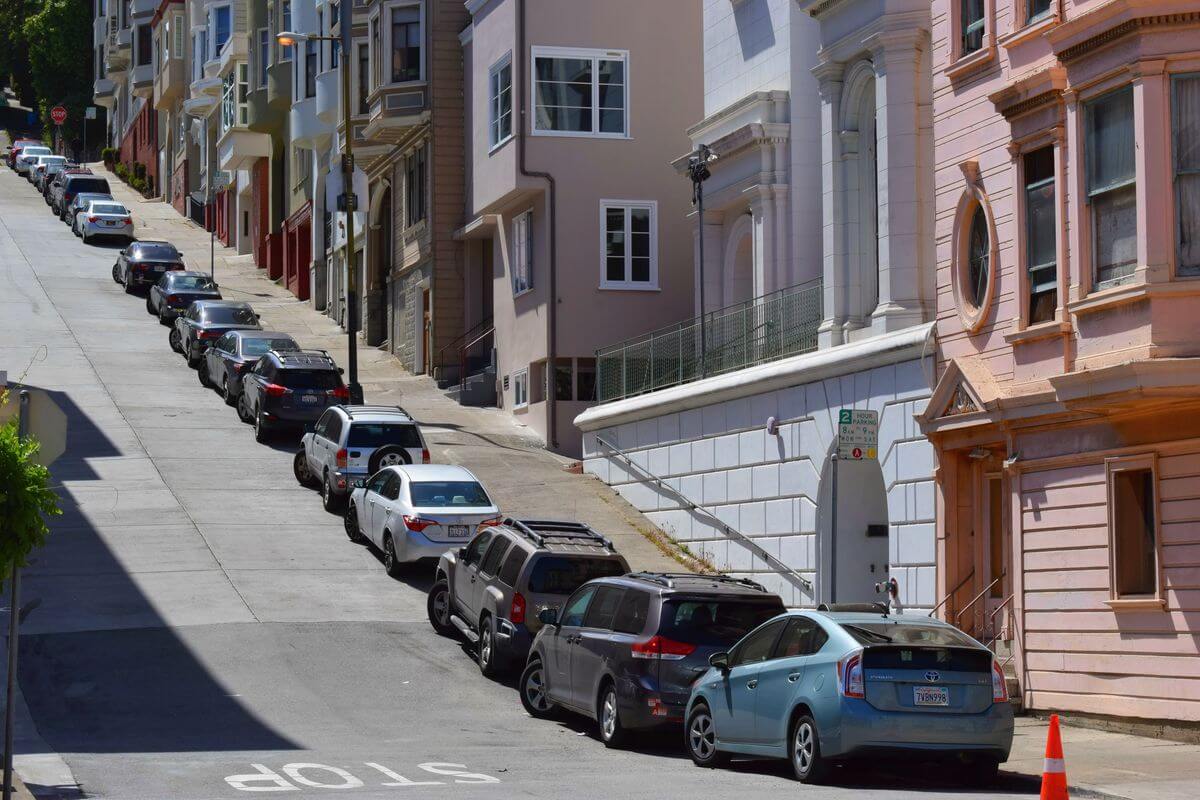
Parking wars raging throughout the Bay Area
With space being such a scarce commodity, it's no wonder that parking is not only a tribulation for drivers but a trial for tenants and is rife with disputes.
July 18, 2025
There’s been some buzz lately about the parking wars in San Francisco. Budget officials floated the novel idea of charging any property owner with a driveway $100 a year to subsidize Muni bus and rail service, but this crackpot measure was quietly scrapped.
Now, after San Franciscans have long been squeezing vehicles into tight, sloping driveways with tails protruding to the sidewalks, parking control officers are clamping down.
Let’s dive into the law relating to parking and some potential conflicts that may arise.

Are tenants entitled to parking?
Tenants do not automatically have a right to parking unless it is explicitly included in the lease agreement. If parking is specified in the lease, the landlord must provide it as agreed upon. However, if the lease is silent on parking, housing providers are generally not obligated to provide it.
The tenant can be assigned a specific space to park, or park on a “first-come, first-served” or open parking basis. This allows more flexibility but can also mean competition for open spots.
However, disputes can arise if the tenant has been using a parking space for a long time without a written agreement, and the landlord tries to revoke it. Whenever tenants come to expect certain amenities such as parking, laundry facilities, maintenance, using common areas, and the like, and these perks are stripped away, the disgruntled tenant tends to make a fuss.
In certain rent-controlled jurisdictions like San Francisco, Oakland, and Berkeley, tenants are prone to air out their grievances at local rent boards and argue that it is a reduction in services that should result in a corresponding decrease in rent.

If housing providers offer parking, they must maintain the lot in a safe, usable condition. Landlords may be held liable for injuries resulting from poor maintenance, such as potholes and inadequate lighting.
Can landlords change the parking terms?
There are several variables, like the type of tenancy, what is spelled out in the lease, and whether there are local rules. Let’s throw out different scenarios.
Checking the lease or rental agreement: If parking is included in the lease as a specific term (e.g., assigned spot, garage use, or included service), it cannot be changed mid-lease unless:
-
The tenant agrees in writing, or
-
The lease expires, and the landlord offers a new lease with updated terms.
Month-to-month tenants: For tenants without a fixed-term lease, parking terms can be changed with proper notice.
-
30 days’ notice if the change is not considered a significant reduction in housing services.
-
60 days’ notice if it’s considered a material reduction in services (e.g., eliminating or charging separately for a previously free space).
With the assistance of Bornstein Law, housing providers can use a Change in Terms of Tenancy notice to legally accomplish this goal.
Yet we’ll have to put a finger on local rules.
In San Francisco, for example, parking changes are regulated under the Rent Ordinance, which requires landlords to have a “just cause” reason to remove or sever housing services from a tenancy, including parking.
In Oakland, changes to parking arrangements in rent-controlled units can likewise be considered a reduction in housing services with a potential impact on rents. Landlords must file a petition for the removal of this essential service, and conversely, tenants can file a petition when they believe they have been slighted with a cutback of services.
Ditto for Berkeley. Removing or changing parking in a rent-controlled unit in Berkley can also be frowned upon and potentially trigger rent control regulations.
Can landlords charge extra for parking? Can parking be rented separately?
Generally speaking, the fundamental question is whether housing services such as parking were promised in the lease. Was parking included in the base or initial rent?
In San Francisco, there can only be a separate charge for parking if:
-
It was never included in the base rent.
-
It’s offered as an optional service, and
-
The tenant agrees voluntarily in writing.
Housing providers cannot charge a separate fee for previously free/included parking. Nor can they remove parking without offering a rent reduction or getting approval from the Rent Board.
Other locales have similar parking rules. We are hard-pressed to go through them all, but we can do the next best thing to ascertain answers to some basic questions.
-
Does the city have rent control, and when was the property built?
-
Is parking considered a housing service? Maybe, maybe not, or it’s up in the air.
-
Can the landlord charge for parking separately? Perhaps they can with tenant consent or a rent reduction, or they will need to file a petition to do so. Proper lease terms may allow them to change the status quo.
-
What does the Rent Board require when meddling with parking rights?
-
What is the length of the tenancy?
-
Has the building been newly constructed? If so, owners may enjoy relaxed requirements for making parking requirements if certain boxes are checked.
These are all relevant questions best journeyed with Bornstein Law.
What if rogue tenants carve out their own parking spaces or violate the lease terms?
Groping for a place to park, tenants will commonly carve out makeshift parking spaces that are not authorized. Renters can park on a lawn, in front of dumpsters, off to the side of driveways, etc. Tenants can also overtake the parking space of a neighboring tenant and thereby create a nuisance by interfering with another’s “quiet enjoyment” of the property. Their visitors can be problematic, as well.
Although tenants can have guests, these invitees will sometimes gobble up valuable parking spaces reserved for paying tenants.
When these guests have vehicles parked for a long time, this raises another concern: Are they guests, or are they long-time, unauthorized occupants not on the lease?
A surefire way to determine whether there an unauthorized people living in a rental unit is whether a stranger’s car is frequently seen on the premises. If the vehicle is witnessed at night, leaves in the morning, and returns in the evening, it’s likely that whoever drives that car is staying there without the landlord’s permission.
We are often asked how to prove that an authorized occupant is occupying the residence, and we say your eyes.

Let’s talk about towing. Follow the rules of the road.
Inevitably, some wayward operators of motor vehicles will park their cars wherever they like, requiring corrective action from housing providers.
Unauthorized parking: Not assigned to a tenant. Someone just “hijacks” the parking space designated for someone else.
Blocking access: The vehicle obstructs driveways, fire lanes, etc.
Parked in a no-parking zone: Some drivers will ignore clearly marked signs indicating that parking is prohibited.
Abandoned or inoperable vehicles: These vehicles can create an eyesore. If not a “just cause” reason for eviction, there are local ordinances that govern the storage of junk.
In instances like these and others, property owners are entitled to tow vehicles, but there are strict requirements that must be followed under California Vehicle Code (CVC §22658). Importantly, there are specific signage requirements on the property alerting non-compliant drivers that they will park their vehicles at their own peril. Additionally, housing providers must notify law enforcement of the removal, stating:
-
Time and location of the tow
-
Reason for towing
-
A licensed towing company’s information
Failure to comply with towing rules can result in civil liability, fines and penalties, as well as claims of tenant harassment, particularly in areas with anti-tenant harassment ordinances.
Should landlords tow vehicles just because they can?
Stranding tenants or their guests may not be in the best interests of housing providers since we want to create a friendly, welcoming rental community. Once parking policies are put into place and they are violated, it is better to first issue reminders and warnings before resorting to towing. We should put this in writing and document all correspondence.
Specificity is in order. We want to document warnings in writing and include:
-
Date and time of the violation
-
Description of the vehicle (make/model/license plate)
-
Location and nature of the violation (e.g., “Vehicle parked in a fire lane” or “Unregistered guest vehicle parked in assigned space”)
-
Reference to the lease clause or parking rule violated
-
Consequences of repeat violations, such as a potential lease violation or towing
-
A deadline to correct the issue
This warning should be delivered in person, posted on the vehicle, mailed, or emailed, and/or posted on the door. We do not want a verbal warning that carries little weight.
Some people get it with a feather. Other people get it with a freight train. When there are repeat offenders, Bornstein Law can escalate the matter and serve a 3-Day Notice to Cure or Quit to recalcitrant tenants.
